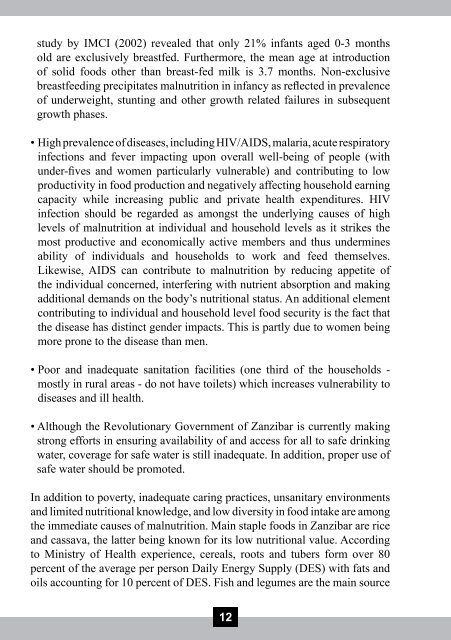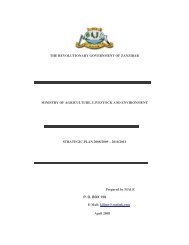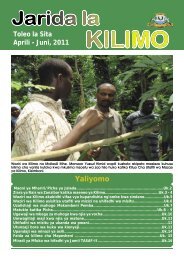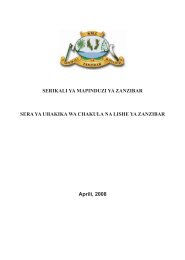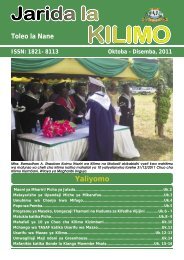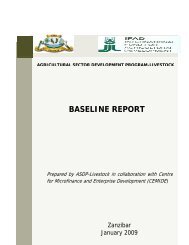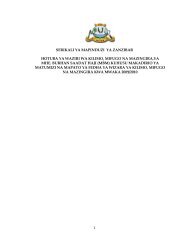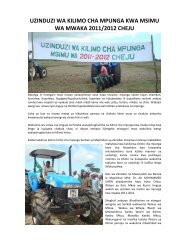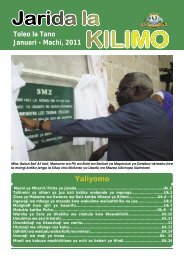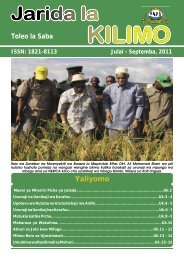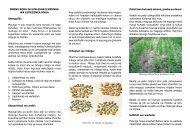ZANZIBAR FOOD SECURITY AND NUTRITION POLICY - Kilimo
ZANZIBAR FOOD SECURITY AND NUTRITION POLICY - Kilimo
ZANZIBAR FOOD SECURITY AND NUTRITION POLICY - Kilimo
You also want an ePaper? Increase the reach of your titles
YUMPU automatically turns print PDFs into web optimized ePapers that Google loves.
study by IMCI (2002) revealed that only 21% infants aged 0-3 months<br />
old are exclusively breastfed. Furthermore, the mean age at introduction<br />
of solid foods other than breast-fed milk is 3.7 months. Non-exclusive<br />
breastfeeding precipitates malnutrition in infancy as reflected in prevalence<br />
of underweight, stunting and other growth related failures in subsequent<br />
growth phases.<br />
• High prevalence of diseases, including HIV/AIDS, malaria, acute respiratory<br />
infections and fever impacting upon overall well-being of people (with<br />
under-fives and women particularly vulnerable) and contributing to low<br />
productivity in food production and negatively affecting household earning<br />
capacity while increasing public and private health expenditures. HIV<br />
infection should be regarded as amongst the underlying causes of high<br />
levels of malnutrition at individual and household levels as it strikes the<br />
most productive and economically active members and thus undermines<br />
ability of individuals and households to work and feed themselves.<br />
Likewise, AIDS can contribute to malnutrition by reducing appetite of<br />
the individual concerned, interfering with nutrient absorption and making<br />
additional demands on the body’s nutritional status. An additional element<br />
contributing to individual and household level food security is the fact that<br />
the disease has distinct gender impacts. This is partly due to women being<br />
more prone to the disease than men.<br />
• Poor and inadequate sanitation facilities (one third of the households -<br />
mostly in rural areas - do not have toilets) which increases vulnerability to<br />
diseases and ill health.<br />
• Although the Revolutionary Government of Zanzibar is currently making<br />
strong efforts in ensuring availability of and access for all to safe drinking<br />
water, coverage for safe water is still inadequate. In addition, proper use of<br />
safe water should be promoted.<br />
In addition to poverty, inadequate caring practices, unsanitary environments<br />
and limited nutritional knowledge, and low diversity in food intake are among<br />
the immediate causes of malnutrition. Main staple foods in Zanzibar are rice<br />
and cassava, the latter being known for its low nutritional value. According<br />
to Ministry of Health experience, cereals, roots and tubers form over 80<br />
percent of the average per person Daily Energy Supply (DES) with fats and<br />
oils accounting for 10 percent of DES. Fish and legumes are the main source<br />
12


